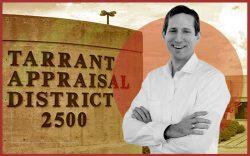Fort Worth council member Alan Blaylock has proposed a hardline solution to the property tax crisis in Texas.
While the vote on the city’s 2023 property tax rate isn’t until the end of September, Blaylock is pushing the city to adopt a “no-new-revenue tax rate,” the Fort Worth Star-Telegram reported.
Essentially, the city would still increase revenue from new properties that are added to the tax rolls in the last year, but the tax rate would be adjusted for properties that were on the tax rolls in 2022 so that the owners paid no more in taxes than they paid that year regardless of any increase in assessed value.
The tax rate being proposed by the city is about 71.25 cents per $100 of property value. Baylock’s is 66.6876 cents per $100 of property value.
Though the city’s proposal is actually a 2-cent decrease from the 2022 tax rate, most homeowners will see their property taxes go up due to rising home values. In fact, residential accounts increased by an average of 14.6% in 2022, according to the Tarrant Appraisal District.
The tax bill for the owner of a home valued at $325,000 would have been $1,731 a year ago, but even with the proposed decrease, it could be $1,853 next year under the city’s proposed tax rate. However, under Baylock’s no-new-revenue rate, the bill would be $1733.86.
Read more


Baylock joined the city council in May after winning a special election on a platform of reining in property taxes. His district runs along the east side of Interstate 35W, from north of Airport Freeway up to the Park Glen and Heritage neighborhoods, and east of downtown, roughly between Airport Freeway and Interstate 30.
Baylock argues that the city should grow its revenue from new development and sales taxes instead of relying on property owners. However, city spokesperson Reyne Telles said his proposal won’t cover the $83 million increase proposed in the city’s general fund budget. The city is only estimated to net about $19 million in 2023 from property taxes on new development. The bulk of the new spending will go to public safety and road maintenance — items Baylock has cited as his top priorities.
Other city council members seemed to agree with Telles.
“I’m sure there are places where we can cut weight, but then it comes down to where is the impact?” said council member Michael Crain, who represents west Fort Worth.
Council member Elizabeth Beck said she’s not comfortable going much lower than the city’s proposed rate and that Baylock’s proposal does not account for rising costs or the additional capacity in departments like Public Works and Development Services that directly address the impacts of Fort Worth’s rapid growth.
“We want people to know we’re being responsible, and we want residents to reach out about what kinds of services they want the city to provide,” Beck said.
— Maddy Sperling
